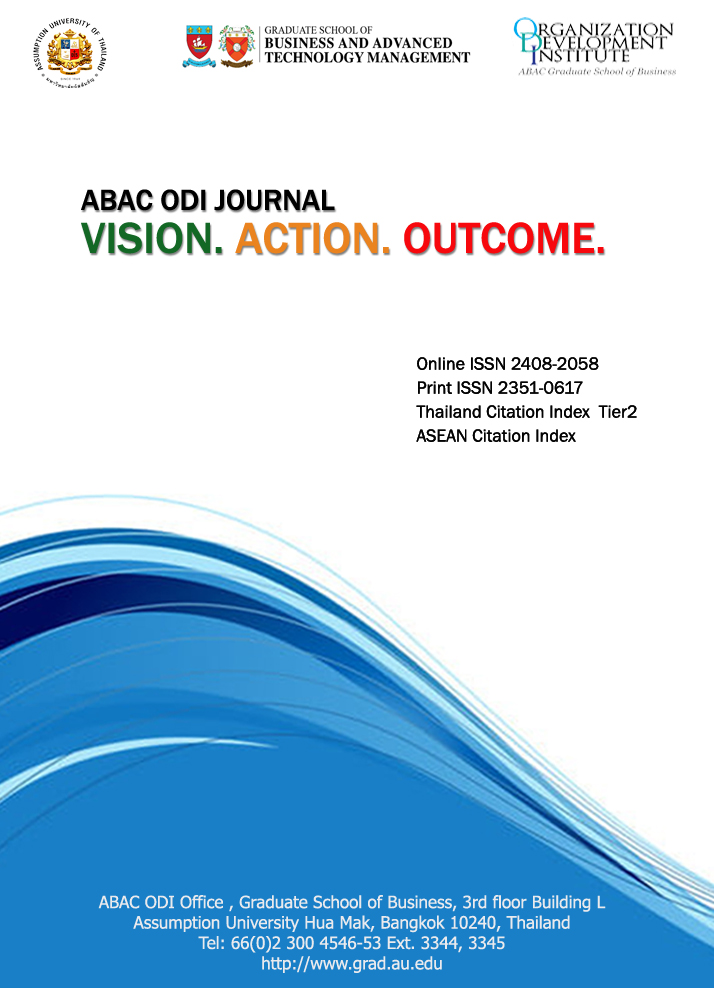An Organization Development Intervention to Enhance the Learning Organization A Case Study of Student Affairs, Assumption University of Thailand
DOI:
https://doi.org/10.14456/abacodijournal.2021.7Abstract
Higher education is evolving rapidly in today’s environment of global connectivity, technological advances and student diversity. The education industry must respond to these changes in order to remain viable. As a key division in the university, Student Affairs plays a vital role in helping universities respond to changes by ensuring that students’ needs are addressed effectively. To accomplish this, Student Affairs must continuously be able to improve by becoming skilled at creating, acquiring and transferring knowledge, in short, it must become a learning organization. The purpose of this study is to enhance the Student Affairs Division of Assumption University to become a learning organization by using organizational development methods including diagnostic procedures, organizational interventions and training programs. Qualitative and quantitative methods were utilized for this study. Data was collected through interviews and questionnaires. Pre-ODI analysis revealed that members of Student Affairs, although cognizant of the importance of some aspects of the learning organization, were not consistent in their behavior and actions. OD interventions were employed to increase both knowledge and behavior in regards to learning organization culture. They included team building, coaching, Appreciative Inquiry and SOAR workshops. Post-ODI analysis of the experimental and control groups using a paired samples t-test, supported by a calculation of Cohen’s effect size, revealed a significant difference in the total gain scores for Pre-ODI and Post-ODI results. The interventions were found to have an effective result in enhancing the learning organization culture in the Student Affairs Division of Assumption University.References
Abu Khadra, M., & Rawabdeh, I. (2006). Assessment of development of the learning organization concept in Jordanian industrial companies. The Learning Organization, 13(5), 455-474. doi:10.1108/09696470610679983
Bond, C., & Seneque, M. (2013). Conceptualizing coaching as an approach to management and organizational development. Journal of Management Development, 23(1), 57-72.
Ciobanu, A. (2013). The role of student services in the improving of student experience in higher education. Procedia-Social and Behavioral Sciences, 92. https://doi.org/10.1016/j.sbspro.2013.08.654
Coghlan, D., & Brannick, T. (2005). Doing action research in your own organization (2nd ed.). Sage Publications.
Cohen, J. (1988). Statistical power analysis for the behavioral sciences. Routledge Academic.
DiBella, A. J. (1995). Developing learning organizations: A matter of perspective. Academy of Management Journal, 38, 287-290. https://doi.org/10.5465/ambpp.1995.17536560
Fapohunda, T. M. (2013). Towards effective team building in the work- place. International Journal of Education and Research, 1(4), 1-12.
Goh, S. C. (1998). Toward a learning organization: The strategic building blocks. SAM Advanced Management Journal, 63(2), 15-20.
Hammond, S. A. (2013). The Thin Book of Appreciative Inquiry (3rd ed.). Thin Book.
Kaewprasith, S. (2018). Improving individual, team and organizational leaming through organization development interventions (ODI): A case study of Assumption College Nakhonratchasima, Thailand [Doctoral dissertation, Assumption University of Thailand]. https://repository.au.edu/handle/6623004553/21730
Kim, J., Egan, T., & Tolson, H. (2015). Examining the dimensions of the learning organization questionnaire: A review and critique of research utilizing the DLOQ. Human Resource Development Review, 14(1), 91-122.
Kolb, D. A. (1984). Experiential learning: Experience as the source of learning and development. Prentice-Hall.
Kontoghiorghes, C., Awbre, S. M., & Feurig, P. L. (2005). Examining the relationship between learning organization characteristics and change adaptation, innovation, and organizational performance. Human Resource Development Quarterly, 16(2), 185-211. doi:https://doi.org/10.1002/hrdq.1133
Liang, G., Fu, W., & Wang, K. (2019). Analysis of t-test misuses and SPSS operations in medical research papers. Burns & Trauma, 7(1). https://doi.org/10.1186/s41038-019-0170-3
Marsick, V. J. (2006). Informal strategic learning in the workplace. In J. N. Streumer (Ed.), Work-Related Learning (pp. 51-69). Springer.
Marsick, V. J., & Watkins, K. E. (2003). Demonstrating the value of an organization’s learning culture: The dimensions of the learning organization questionnaire. Advances in Developing Human Resources, 5(2), 132-151.
Norlin, J. M. (2009). Human behavior and the social environment: Social systems theory. Allyn & Bacon.
Romme, A. G. (2011). Organizational development interventions: An artifaction perspective. The Journal of Applied Behavioral Science, 47(1), 8-32.
. Rothwell, W. J., Sullivan, R., & McLean, G. N. (1995). Practicing organization development. Jossey-Bass.
Sadhu, A. K. (2009). Interventions for change. https://www.management4all.org/2009/11/interventions-for-change.html?m=1
Senge, P. M. (1990). The fifth discipline: The art & practice of the learning organization. Doubleday Business.
Smith, L. N., & Blixt, A. B. (2015). Leading innovation and change: A guide for chief student affairs offices on shaping the future. National Association of Student Personnel Administrators.
Stavros, J., & Hinrichs, G. (2009). The Thin book of SOAR: Building strengths-based strategy. Thin Book.
Tripp, D. (2005). Action research: A methodological introduction. Educação e Pesquisa, 31(3). doi:10.1590/s1517-97022005000300009
Tuckman, B. W., & Jensen, M. A. C. (1977). Stages of small-group development revisited. Group & Organization Management, 2, 419-427. doi:10.1177/105960117700200404
Watkins, K. E., & Marsick, V. J. (1993). Sculpting the learning organization: Lessons in the art and science of systemic change. Jossey-Bass.
Watkins, K. E., & Marsick, V. J. (1996). In action: Creating the learning organization. American Society for Training and Development.
Watkins, K. E., Yang, B., & Marsick, V. J. (1997). Measuring dimensions of the learning organization. In R. J. Torraco (Ed.), 1997 Conference Proceedings of the Academy of Human Resource Development (pp. 543-546). Baton Rouge, LA: AHRD.



